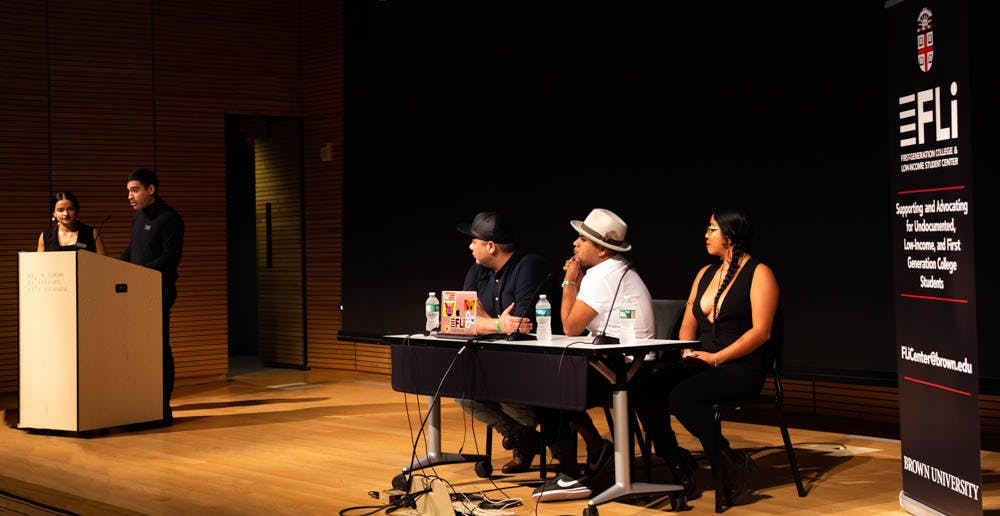On Tuesday night, three artists took the stage at the First-Generation College and Low-Income Student Center for a frank and informal discussion about the joys and challenges of being undocumented. “Undocu-Friendship: Artistas Triunfando A Través De La Comunidad” featured visual artist Julio Salgado, poet and writer Yosimar Reyes and DJ Sizzle Fantastic.
The purpose of the event was to highlight “what we’re doing as undocumented immigrants that’s creative,” said Renata Mauriz ’17.5, FLi Center student success coordinator and one of the event’s organizers. The event was a space to “talk about friendship (and their) work and amplify their narratives,” she added.
As a child, Salgado used to draw his teachers while sitting in the back row of the classroom. After moving to Long Beach, California as a young teenager with his family, Salgado learned to express himself through art while navigating a language barrier. During his college years, Salgado was a political cartoonist for his school newspaper but chose not to major in visual art because he found the curriculum too rigid and inaccessible.
Salgado began his talk with this introduction: “I am a queer artist of color, and I am still alive.” Salgado explained that he envisions art as a form of resistance; after the Orlando nightclub shooting, Salgado created an image captioned “Don’t stop dancing” to assert the importance of gay bars as places for the marginalized community to “party and organize.”
Salgado aims to “fight back through art” against the misrepresentation of people with marginalized identities. Taking inspiration from popular culture, Salgado’s artistic creations reimagine popular sitcoms such as “Friends” and “Gilmore Girls” with black or Hispanic characters. “Hollywood is important,” Salgado said. Many people who dislike undocumented immigrants are not exposed to academic or activist work from this community, he said. Instead, “they’re watching TV. It’s important for us to infiltrate those bases.”
Reyes grew up on the East Side of San Jose with his grandparents in a neighborhood composed of predominantly undocumented people. Growing up, his apartment often housed undocumented people, since his family rented out three rooms for extra income. Like Salgado, Reyes found a creative outlet in art, namely poetry. He self-published his first collection of poetry, “For Colored Boys Who Speak Softly…” with Mexican-American guitarist Carlos Santana.
Focusing on the intersection of the experiences of undocumented immigrants and low-income people could forge a path of solidarity between people of different races and immigration statuses, Reyes said.
Growing up in Boyles Heights, Los Angeles, DJ Sizzle’s teenage years were marked by a pressure to assimilate and “keep all her other identities closeted,” she said. Throughout high school, she built a reputation as a competitive cheerleader while hiding the fact that she worked 50 hours a week as a food vendor and housekeeper. But after her undocumented status made her ineligible to work as a cheerleading coach, DJ Sizzle reconsidered her efforts to assimilate. “Assimilation is a … drug and a trap,” she said.
Since then, DJ Sizzle has devoted herself to organizing activist movements. For instance, she helped lead a campaign to fight gentrification in her community when a number of art galleries appeared in the area.
Throughout Tuesday’s event, panelists criticized the dominant narrative of undocumented people in the media. “The current narrative is based on fear (of deportation),” Reyes said. He added that the media often portrays undocumented immigrants as “in despair and crying” and people who cannot speak for themselves in order to “pacify the anxiety” of white Americans.
Salgado echoed Reyes’s concern. Referencing the pressure undocumented immigrants face to prove their right to reside in the United States, Salgado said that “it all starts with ‘Look America — I went to college and even joined the military.’” People who grew up undocumented are often led to believe that “it’s the fault of (their) parents. But that’s fucked up. My parents are courageous and responsible — that’s why I am here,” Salgado added.
John Lopez, an organizer of the event, told The Herald that the FLi Center reached out to this group of artists after seeing them on social media. “It is misleading that in news and the media, undocumented immigrants are seen as people in cages,” Lopez said. He incorporated the Undocu-Friendship panel into the year-long series — Undocu — to “focus on the fact that (undocumented immigrants) are real people who laugh and form connections.”
Oscar Espiricueta ’21 particularly enjoyed the way that the panel “helped to change the undocumented narrative.” Espiricueta would also have liked to see different examples of resistance that the panelists engaged with, from attending rallies to confronting the daily dangers that accompany being undocumented.





